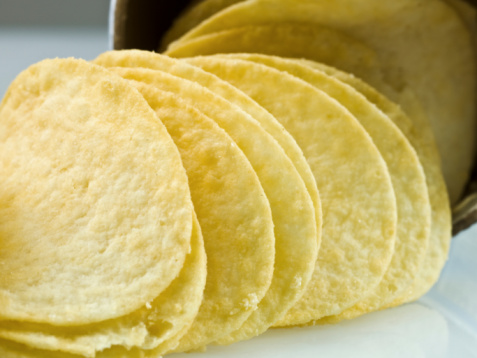 Walk down the snack aisle in your local grocery store and you’ll see countless varieties of chips. Some claim to be “healthy” alternatives that are baked, have zero trans fat, or are low in saturated fat. Others are made from ingredients other than potatoes, like rice or corn, and claim to be “healthy” treats. But at the end of the day, a chip, no matter how much healthier it may appear than another brand, is rarely something that should be considered a food that promotes good health. Recent research, however, challenges this theory.
Walk down the snack aisle in your local grocery store and you’ll see countless varieties of chips. Some claim to be “healthy” alternatives that are baked, have zero trans fat, or are low in saturated fat. Others are made from ingredients other than potatoes, like rice or corn, and claim to be “healthy” treats. But at the end of the day, a chip, no matter how much healthier it may appear than another brand, is rarely something that should be considered a food that promotes good health. Recent research, however, challenges this theory.
A team from the University of Cincinnati has suggested that the snack food additive olestra can speed up the removal of dangerous toxins from the body.
Olestra (also known under the brand name “Olean”) was invented in 1996 by The Proctor & Gamble Company as a food additive. It’s a non-absorbable fat that’s used in low-calorie snack food, but after coming under fire in recent years, its usage has dramatically decreased. One snack that still uses it, however, is “Pringles” chips.
The team fed Pringles to people with a high number of PCB toxins (polychlorinated biphenyl) in their bodies. Olestra appeared to flush these toxins out of their systems at a relatively fast pace. This makes sense because one of the features of olestra is its insolubility. It passes through the system rather quickly, often taking other compounds with it. In fact, one of the biggest knocks against olestra—and one of its dangers—is that it would unintentionally remove valuable nutrients and compounds from the body, limiting absorption and potentially causing health problems. Furthermore, it can cause all kinds of discomfort, often resulting in stomach pains, indigestion, and diarrhea.
But clearly, olestra doesn’t discriminate—it removes the bad with the good.
PCBs are man-made chemicals that have been used for hundreds of commercial and industrial applications. Usage has been banned in America since 1979. Some examples of where they were found may be in pigments, dyes, plastics, rubber products, paper, and a number of other items. As you can imagine, they were nearly impossible for humans to avoid. Furthermore, they don’t break down easily and are still found in soil, water, and air. Because of this, they have infiltrated our food supply.
Although they have been banned for more than 30 years, products manufactured before this time might still contain PCBs, and it’s possible that you might have unknowingly had a lot of exposure to them already, making these toxins present in your system. To this day, however, they are mostly absorbed through food. They’ve been known to cause problems in the immune, reproductive, and nervous systems and can cause cancer.
Participants in the study all had high levels of PCB toxins in their bodies. There were 28 patients under observation for a year, divided into two groups. One was instructed to eat 12 Pringles per day made with vegetable oil, while the other was asked to eat 24 Pringles a day made with olestra. (The amount of chips differed to make up for caloric discrepancies.) The group who ate the olestra Pringles experienced an eight-percent reduction in PCB levels, eight times the amount of the vegetable oil group.
Does this make Pringles a health food? I would stop well short of going there. It’s likely the health implications from eating chips every day are worse for you than the trace amounts of PCB that might be in your system. At the end of the day, junk food is still junk food. Furthermore, Time magazine named olestra one of the “50 worst inventions” because of its poor health impacts. It essentially strips the body of essential vitamins and minerals and causes a number of digestive problems.
Sources for Today’s Article:
Gentilviso, C., “Worst Inventions: Olestra,” Time magazine web site, May 27, 2010; http://content.time.com/time/specials/packages/article/0,28804,1991915_1991909_1991785,00.html, last accessed April 16, 2014.
“Chips with olestra cause body toxins to dip, study finds,” University of Cincinnati Academic Health Center, ScienceDaily web site, April 9, 2014; http://www.sciencedaily.com/releases/2014/04/140409143946.htm, last accessed April 16, 2014.
